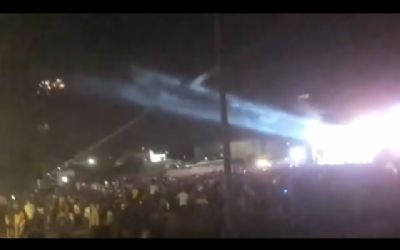The Israeli army struck a wide range of Hamas targets throughout the Strip overnight Friday after ten rockets were launched at Israel on Friday evening, marking the second such attack in two days. The Gaza Health Ministry reported one dead in the strikes.
The Israeli military said that eight of the rockets were intercepted by the Iron Dome missile defense system.
A house in Sderot was hit by shrapnel. Emergency medical responders said that the residents of the house, a couple in their forties and their children, had been staying in their home's safety shelter and were not injured.
The Israel Police stated that several vehicles in the city were damaged by rocket shrapnel.
Magen David Adom said that an Israeli woman, aged 65, was lightly injured when she fell down while running for shelter in Sderot.
Sirens were again heard in the southern Israeli city of Sderot overnight Friday. The Israeli army said that they had identified an object launched toward Israel, but that it was not a rocket.
The Israeli army said that the air force had struck a wide range of Hamas targets in the Strip. Among others, Israel struck a military base, a military compound containing an anti-missile shooting simulator, a weapons factory, a weapons storage compound and underground infrastructure in the northern, central and southern Strip.
The statement added that the attacks were in response to the rocket fire Friday evening, for which the army holds Hamas responsible.
Although Israel has attributed rocket fire from Gaza over the past few months to Islamic Jihad, the Israeli military holds Hamas, as the ruling power in the Strip, responsible for all attacks emanating from the coastal enclave.
The Gaza Health Ministry reported that 27-year-old Ahmad Muhammad al-Shakhri died of his wounds after being critically injured in an Israeli strike west of Khan Yunis. Two others were wounded in the strike, and transferred to Nasser hospital in Khan Yunis, the ministry said.
Hamas spokesman Fawzi Barhoum said Saturday morning that "Israeli aggression against [Hamas] positions and civilians is a continuation of the aggression and crime of the Zionist entity agains tthe Palestinian people, and a grave escalation for which Israel will bear responsibility." He added, "The extent of the destruction indicates the enemy's preliminary plans to cause destruction and harm, and it will come back like a boomerang on Israel."
Islamic Jihad also released a statement, saying that Prime Minister Benjamin Netanyahu "is trying to cover up his corruption and failure by means of an escalation against the Gaza Strip and harming infrastructure, buildings and civilians, as happened in Khan Yunis, and Israel bears responsibility for this escalation."
As defense minister, Netanyahu held consultations throughout the night Friday with the Israel Defense Forces Chief of Staff Lt. Gen. Aviv Kochavi, the head of the Shin Bet security service, the National Security Council and senior IDF officials, and directed operations, the prime minister's bureau stated.
Earlier Friday, rocket alerts were activated in Sderot and in the local regional council of Sha'ar HaNegev.
The security establishment pointed at the commander of Islamic Jihad's northern brigade as the man in charge of the recent attacks. Security sources have said that the commander, Baha Abu al-Ata, has his own indepedent policy which Hamas is struggling to rein in.
Relative calm interrupted
Arab press has reported recently of progress in talks, mediated by Egypt and Qatar, which are meant to ensure the calm between Israel and Hamas in return for Israeli concessions and the continuation of a monthly Qatari cash infusion into the Strip.
On Thursday, a rocket was fired from the Gaza Strip toward the local regional councils of Eshkol and Sdot Negev. A siren sounded and the Iron Dome missile defense system was activated, but no interception took place. No injuries were reported and the site where the rocket landed was not found, although locals reported hearing blasts. In response to the rocket fire, the Israeli army struck Hamas posts through the air as well as with artillery fire east of Gaza City. Palestinian reports indicated that no injuries were caused as a result of the Israeli strikes.
Earlier this month, two rockets were launched from Gaza toward Israel but had failed to reach Israeli territory.
The past several months have seen a relative calm along the border between Israel and the coastal enclave. The last serious flare-up took place in August, when Palestinians targeted Israel with rockets on four different occasions. During one of those attacks, Netanyahu was forced to evacuate the stage mid-speech while he was making an address in Israel's south ahead of the September 17 election. Following that strike, the premier slashed Gaza fuel imports in half in retaliation for the ongoing rocket fire.
November 2, 2019
Palestinians in Gaza Launch Ten Rockets at Israel
Date
November 2, 2019
Title
Gaza Barrage: IDF Strikes Hamas Targets After 10 Rockets Launched at Israel, Gaza Ministry Reports One Dead,
Haaretz
Author(s)
Amos Harel, Jack Khoury, Almog Ben Zikri and Noa Landau
Original Source

